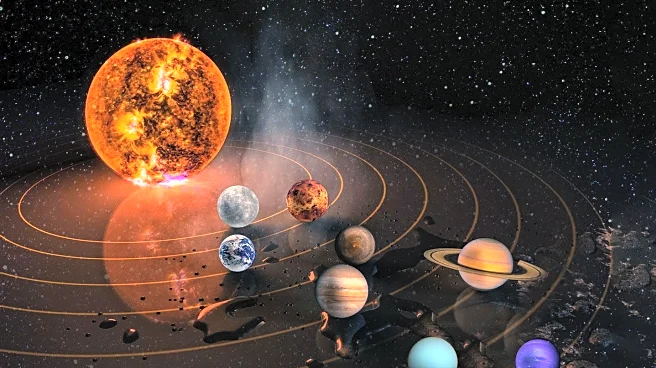What's Happening?
A recent report by the New York Times has sparked controversy by suggesting that the astrological signs many people identify with may not be accurate due to the Earth's wobble. This wobble, which shifts the view of the stars by one degree every 72 years, has altered the position of the constellations since the Babylonians first created the zodiac signs. The report claims that this shift means the sun is now in front of different constellations during certain times of the year, potentially changing individuals' zodiac signs. However, astrologer Aliza Kelly argues that modern tropical astrology is based on the seasons and is geocentric, meaning it is anchored by our perspective on Earth rather than the actual position of the constellations. Kelly emphasizes that astrology is a tool for self-empowerment and empathy, distinct from astronomy.
Why It's Important?
The debate over the accuracy of zodiac signs highlights the broader discussion about the role and validity of astrology in contemporary society. Astrology has gained significant popularity as a means of personal insight and empowerment, despite skepticism from scientific communities. The New York Times' report could influence public perception of astrology, potentially leading to a reevaluation of its significance in personal and cultural contexts. For those who closely identify with their zodiac signs, the suggestion of a change could impact their sense of identity and personal narrative. Additionally, the report may affect the astrology industry, which includes horoscope publications, astrology apps, and personal consultations, by challenging the foundational assumptions of zodiac-based predictions.
What's Next?
Astrologers and enthusiasts are likely to continue defending the traditional zodiac system, emphasizing its symbolic rather than literal interpretation. The astrology community may engage in further public discourse to clarify misconceptions and reinforce the distinction between astrology and astronomy. Meanwhile, media outlets might explore the topic further, potentially leading to more public interest and debate. As astrology remains a popular cultural phenomenon, its practitioners may seek to educate the public on its principles and applications, ensuring that its role as a tool for personal growth and understanding is preserved.
Beyond the Headlines
The controversy underscores the tension between scientific skepticism and cultural practices that are not empirically based but hold significant personal meaning for many. This situation reflects a broader societal trend where traditional beliefs and modern scientific understanding often intersect, leading to discussions about the value and place of non-scientific practices in a rational world. The enduring popularity of astrology, despite scientific criticism, suggests a persistent human desire for meaning and connection beyond empirical evidence.











